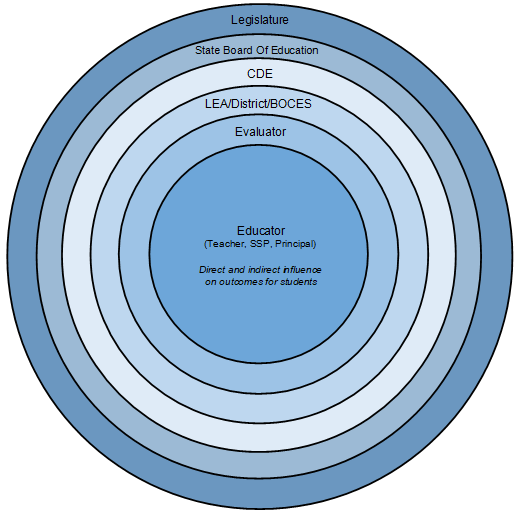You are here
Spheres of Influence: Who Does and Decides What
Educator Effectiveness: Who Does and Decides What
The following illustrates the interconnectedness and influence the various stakeholders have—directly and indirectly—related to educator effectiveness in Colorado.
View a PDF version of this webpage here.

The following tables highlight the roles and responsibilities for stakeholders related to educator effectiveness (EE) in Colorado. This is not an exhaustive list and additional examples may be added.
Colorado Legislature
Colorado Legislature |
|
|---|---|
|
EE Scope & Role:
|
|
|
Decisions:
|
|
|
Examples:
|
|
|
EE Requirements in Statute:
*MSOs for SSPs may include a collective measure, yet a collective measure is not required for SSPs. |
State Board of Education
State Board of Education |
|
|
EE Scope & Role:
|
|
|
Decisions:
|
|
|
Examples:
|
|
|
EE Requirements in State Board Rule:
|
Colorado Department of Education
Colorado Department of Education |
|
|
EE Scope & Role:
|
|
|
Decisions:
|
|
|
Examples:
|
Local Education Agency (LEA) / School District/BOCES
Local Education Agency (LEA) / School District/BOCES |
|
|
EE Scope & Role:
|
|
|
Decisions:
|
|
|
Examples:
|
Evaluators
Evaluators |
|
|
EE Scope & Role:
|
|
|
Decisions*:
*These decisions may be made by the district, school, and/or evaluator. |
|
|
Examples:
|
Educators
Educators |
|
|
EE Scope & Role:
|
|
|
Decisions*:
|
|
|
Examples:
|


Connect With Us





